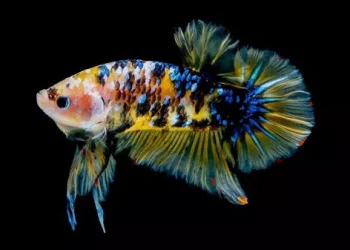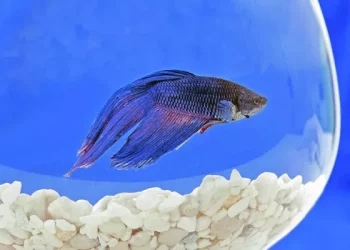When you think of pets, you might picture a playful dog or a cuddly cat. But have you ever considered the betta fish? These vibrant, graceful creatures bring joy and color to homes around the world. They are not just pretty faces; they have fascinating behaviors that intrigue many fish enthusiasts. One such behavior is when betta fish swim fast. So, what does it mean when your betta is zipping around its tank like it’s on a caffeine rush? Buckle up, as we dive into the colorful world of betta fish and explore the reasons behind their speedy swims.
The Basics of Betta Fish
Before we explore the reasons for their fast swimming, let’s take a moment to appreciate what betta fish are all about. Native to the shallow waters of Southeast Asia, bettas (Betta splendens) are known for their spectacular fins and vibrant colors. They come in various shades, including blue, red, green, and even purple. Each fish is like a living piece of art.
Characteristics of Betta Fish
Betta fish are known for their unique physical and behavioral traits. They have long, flowing fins that resemble delicate curtains billowing in a gentle breeze. Their bodies are sleek and often iridescent, making them a feast for the eyes.
But bettas are not just pretty fish; they also have distinct personalities. Some bettas are shy and prefer to hide among plants, while others are bold and love to explore their environment. They can be aggressive, especially males, and often display territorial behavior. This unique blend of beauty and personality is what makes bettas such captivating pets.
Understanding Fish Behavior
Fish behavior can be perplexing for pet owners. Unlike dogs or cats, fish can’t bark or meow to communicate their feelings. Instead, they rely on body language and swimming patterns. Understanding these behaviors can help you decipher what your betta is trying to tell you.
Factors Influencing Fish Behavior
Several factors influence the swimming behavior of bettas. These include:
Water Conditions: The quality of the water plays a significant role in fish behavior. Bettas thrive in clean, warm water. If the water is too cold, dirty, or contains high levels of ammonia, your betta may swim erratically.
Tank Environment: The setup of your fish tank can impact your betta’s behavior. A tank with plenty of hiding spots and plants will encourage natural swimming patterns. In contrast, a bare tank may lead to boredom and restlessness.
Diet: What you feed your betta can also influence its energy levels. A balanced diet with high-quality pellets and occasional treats can help keep your fish healthy and active.
Tank Mates: Bettas can be quite territorial. If you have other fish in the tank, your betta may feel threatened or stressed, causing it to swim faster or behave aggressively.
The Meaning Behind Fast Swimming
Now that we have a foundation, let’s get to the heart of the matter: what does it mean when your betta fish is swimming fast? Here are several reasons for this lively behavior.
Excitement and Playfulness
One of the most common reasons for a betta to swim fast is excitement. Bettas are curious creatures, and they often swim around their tanks when they are stimulated or happy. You might notice your betta speeding around when you approach the tank, especially if it’s time for feeding. This behavior shows that your betta is eager and engaged with its environment.
Playful Antics: Bettas love to explore. If you add new decorations or change the tank layout, your betta might zoom around to investigate every nook and cranny. Think of it as your betta’s version of a fun obstacle course!
Territory Defense
Male bettas are notorious for their territorial behavior. When a male sees its reflection in the tank glass, it may interpret it as a rival. In this case, the betta may swim rapidly back and forth, flaring its fins and showing off its colors. This behavior is often a warning to potential intruders, letting them know that this is its turf.
Mirror, Mirror: Some owners mistakenly use mirrors to showcase their betta’s beauty. While it may seem entertaining, it can stress the fish and lead to excessive fast swimming. So, save the mirrors for the bathroom!
Stress and Agitation
While fast swimming can indicate excitement, it can also signal stress. If your betta is darting around the tank and seems frantic, it may be experiencing agitation. Common stressors include poor water quality, overcrowding, or aggressive tank mates.
Signs of Stress: Look for additional signs such as fin clamping (when fins are held close to the body), color fading, or hiding. If you notice these behaviors, it’s time to check the water parameters and make necessary adjustments.
Breeding Behavior
When it comes to breeding, male bettas can become exceptionally active. During the breeding season, males will often swim rapidly in an attempt to attract females. They may build bubble nests and showcase their vibrant colors, zipping around the tank to display their health and vitality.
Love is in the Water: If you have both male and female bettas, you may notice this energetic display during courtship. However, be cautious, as male bettas can become aggressive if they feel their territory is threatened.
Exercise
Just like humans, fish need exercise too! Fast swimming can be a sign that your betta is getting its daily workout. Bettas are naturally active swimmers and enjoy darting around their habitat. A well-structured tank with ample space allows them to engage in healthy physical activity.
Creating a Gym: To encourage exercise, provide plenty of swimming space and add decorations that stimulate movement. Plants, caves, and driftwood can create a dynamic environment where your betta can thrive.
Health Issues
Sometimes, fast swimming can indicate underlying health issues. If your betta is behaving unusually and swimming frantically, it may be a sign of illness or discomfort. Common health problems include parasites, fin rot, or swim bladder disease.
See Also: What Fish Can Go with a Male Betta?
Keeping an Eye Out: Watch for additional symptoms, such as bloating, loss of appetite, or abnormal swimming patterns (like floating sideways). If you suspect your betta is unwell, consulting a veterinarian who specializes in fish can help identify the problem.
Recognizing Patterns
As a responsible pet owner, it’s crucial to observe your betta’s behavior over time. Keeping track of any changes can help you identify potential issues early. Here are some tips for recognizing patterns:
Daily Observation: Spend time watching your betta each day. Note its swimming patterns, color, and overall demeanor. Changes can be subtle, so regular observation is key.
Record Keeping: Consider maintaining a log of your betta’s behavior. Jot down any changes in swimming speed, feeding habits, or interactions with tank mates. This information can be invaluable if you need to consult with a veterinarian.
Adjustments and Reactions: If you notice a change in behavior, assess your tank conditions. Check the water parameters, tank setup, and any recent changes you’ve made. Adjustments may be necessary to restore harmony.
Creating a Healthy Environment
To promote healthy behavior and reduce stress, it’s essential to create a suitable environment for your betta. Here are some tips for maintaining a happy, healthy tank:
Water Quality
Maintaining pristine water quality is crucial for the well-being of your betta. Regularly test the water for ammonia, nitrites, and nitrates. Keep the water temperature between 76-82°F (24-28°C) and perform regular water changes to keep the environment clean.
Tank Size and Setup
While bettas can survive in small bowls, a larger tank is always better. A minimum of 5 gallons is recommended to provide ample swimming space. Incorporate plants, caves, and decorations that allow for exploration while also offering hiding spots for security.
Companionship
If you choose to keep multiple fish, ensure they are compatible. Bettas can be aggressive, especially towards other males. Research suitable tank mates, and consider using a divider if you want to house multiple bettas in the same tank.
Nutrition
Feed your betta a balanced diet to keep it healthy and active. High-quality pellets, freeze-dried foods, and occasional treats like bloodworms can provide essential nutrients. Overfeeding can lead to health issues, so stick to small portions.
Conclusion
Understanding the behaviors of your betta fish can deepen your bond and enhance your experience as a pet owner. When you see your betta swimming fast, take a moment to consider the context. Is it excitement? Stress? Breeding behavior? Each swim tells a story, and it’s your job to interpret it.
By creating a healthy environment and observing your betta’s behavior, you can ensure it leads a happy and fulfilling life. Remember, your betta is not just a decoration; it’s a living creature with its own personality and quirks. So the next time you witness that delightful aquatic dance, you’ll know exactly what it means!
In the enchanting world of fishkeeping, every swirl, splash, and dart has its significance. Embrace the adventure, and let your betta’s vibrant personality shine through!
Related Topics:

























